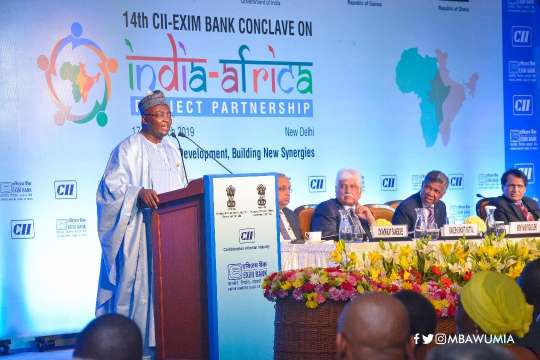 Vice President Dr. Mahamudu Bawumia has encouraged investors in India to constructively engage their African counterparts for business development as they gear up towards taking their destinies into their own hands to assume their rightful places in the comity of nations.
Vice President Dr. Mahamudu Bawumia has encouraged investors in India to constructively engage their African counterparts for business development as they gear up towards taking their destinies into their own hands to assume their rightful places in the comity of nations.
He said Africa was on the move towards shaking off her past failures as a result of the colonial experiences and cold-war alignments, compounded by sheer bad governance.
Vice President Bawumia was addressing delegates at the ongoing 14th CII-EXIM Bank Conclave on India-Africa Project Partnership, in New Delhi, India, on Sunday.
“The new scramble for Africa, according to the Economist Magazine, is now being led by a new generation of Africans determined to make a difference through technological innovations and development of enterprise and markets,” he stated.
“The Africa we want can only be built by Africans in partnerships with countries and investors who also believe in this paradigm for change”.
The three-day Conclave, under the theme, “Partners in Development, Building New Synergies,” organised by the Confederation of Indian Industry (CII) in collaboration with the Export-Import (EXIM) Bank of India, brought together more than 500 Ministers and Heads of Government from 41 African countries.
Over the past 13 editions, the CII- EXIM Bank Conclave on India Africa Project Partnership has emerged as the pioneer event for Indian and African governments and industry to meet and explore new avenues of partnerships, and enables the Indian and African leadership to take stock of the progress of the partnership and address future needs.
Outlining a number of areas, which would make an investment in Africa an attractive proposition, Vice President Bawumia urged participants to let the conversation about the future of Africa move outside “old boxes of doing business and old government-business engagements”.
“Africa is an emerging market that offers great opportunities for economic growth and prosperity with over 1.2 billion people and a combined GDP of US$2.24 trillion.
” It is the world’s second largest and second most populous continent, and by 2050 will be the most populous continent in the world with an estimated GDP of $29 trillion.”
He said the continent was endowed with natural resources with the right complementary factors, which could be leveraged on for accelerated and inclusive economic growth.
He said Africa was the home of the world’s 15 fastest growing economies and the growth rate was expected to boost consumer spending from USD $860 billion in 2008 to more than USD $1.3 trillion by 2020.
The leaders of the continent, Vice President Bawumia said, were making trading less cumbersome with the declaration of the African Union’s Agenda 2063, the continental body’s long-term vision for an integrated and prosperous continent.
He said considering the significance of free movement of goods, services and persons across borders to socio economic development, the Single African Air Transport Market (SAATM), a Flagship project of the African Union Agenda 2063, was launched to create a single market for Air transport in Africa.
This was to allow significant freedom of air transport in Africa.
On March 21, 2018, in the Rwandan capital, Kigali, the President of Ghana, Nana Addo Dankwa Akufo-Addo, and other African leaders had the pleasure of signing the Agreement establishing the African Continental Free Trade Area, (AfCFTA).
It is intended to enhance air connectivity, improve intra-African trade, expand markets through continental economic integration and free movement of people, provide greater business opportunities.
Vice President Bawumia said it was in that context that he encouraged the relevant public officials from Ghana and India to engage in discussions that could open doors for business-to-business cooperation and mutually beneficial partnerships.
“This is a sure way for our two sides to explore the economic opportunities that abound in Africa and India.
“Let us leave here with concrete engagements in business partnerships in key strategic areas.
“Let us know what we are not doing well as governments and what can be done to strengthen business partnerships.
“Together, let us push hard so we can improve the lives of ordinary citizens in India and Africa so that they too will realise that these industry conversations are also beneficial to them in the long run.”
Source: GNA























